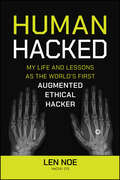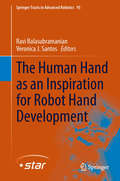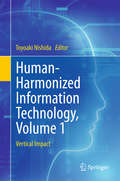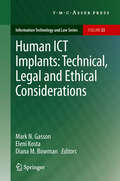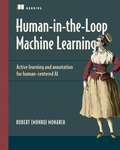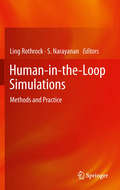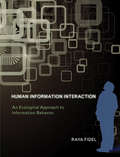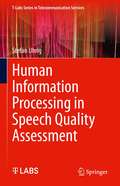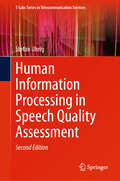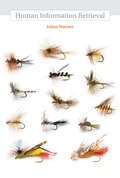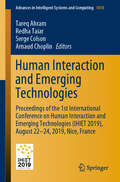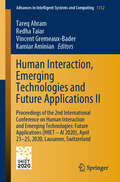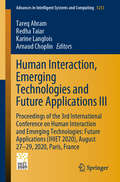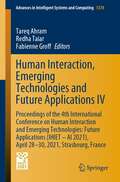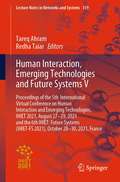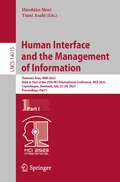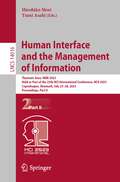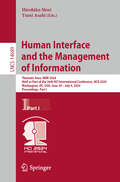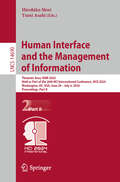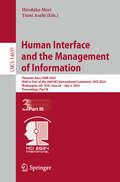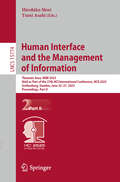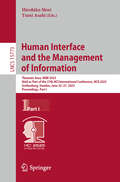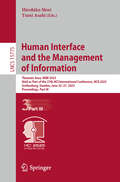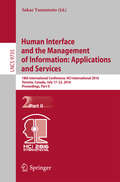- Table View
- List View
Human Hacked: My Life and Lessons as the World's First Augmented Ethical Hacker
by Len NoeDiscover the future of cybersecurity through the eyes of the world's first augmented ethical hacker In Human Hacked: My Life and Lessons as the World's First Augmented Ethical Hacker by Len Noe, a pioneering cyborg with ten microchips implanted in his body, you'll find a startlingly insightful take on the fusion of biology and technology. The author provides a groundbreaking discussion of bio-implants, cybersecurity threats, and defenses. Human Hacked offers a comprehensive guide to understanding an existing threat that is virtually unknown. How to implement personal and enterprise cybersecurity measures in an age where technology transcends human limits and any person you meet might be augmented. The book provides: Exposure of a subculture of augmented humans hiding in plain sight Explorations of the frontier of bio-Implants, showing you the latest advancements in the tech and how it paves the way for access to highly restricted technology areas Discussions of cybersecurity tactics, allowing you to gain in-depth knowledge of phishing, social engineering, MDM restrictions, endpoint management, and more to shield yourself and your organization from unseen threats A deep understanding of the legal and ethical landscape of bio-implants as it dives into the complexities of protections for augmented humans and the ethics of employing such technologies in the corporate and government sectors Whether you're a security professional in the private or government sector, or simply fascinated by the intertwining of biology and technology, Human Hacked is an indispensable resource. This book stands alone in its category, providing not just a glimpse into the life of the world's first augmented ethical hacker, but also offering actionable insights and lessons on navigating the evolving landscape of cybersecurity. Don't miss this essential read on the cutting edge of technology and security.
The Human Hand as an Inspiration for Robot Hand Development
by Ravi Balasubramanian Veronica J. Santos"The Human Hand as an Inspiration for Robot Hand Development" presents an edited collection of authoritative contributions in the area of robot hands. The results described in the volume are expected to lead to more robust, dependable, and inexpensive distributed systems such as those endowed with complex and advanced sensing, actuation, computation, and communication capabilities. The twenty-four chapters discuss the field of robotic grasping and manipulation viewed in light of the human hand's capabilities and push the state-of-the-art in robot hand design and control. Topics discussed include human hand biomechanics, neural control, sensory feedback and perception, and robotic grasp and manipulation. This book will be useful for researchers from diverse areas such as robotics, biomechanics, neuroscience, and anthropologists.
Human-Harmonized Information Technology, Volume 1
by Toyoaki NishidaGoing from the philosophy and concepts to the implementation and user study, this book presents an excellent overview of Japan's contemporary technical challenges in the field of human-computer interaction. The next information era will be one in which information is used to cultivate human and social potential. Driven by this vision, the outcomes provided in this work were accomplished as challenges to establish basic technologies for achieving harmony between human beings and the information environment by integrating element technologies including real-space communication, human interfaces, and media processing. Ranging from the neuro-cognitive level to the field trial, the research activities integrated novel perceptual technologies that even exceed human ability to sense, capture, and affect the real world. This book grew out of one of the CREST research areas funded by the Japan Science and Technology Agency. The theme of the project is "the creation of human-harmonized information technology for convivial society", where 17 research teams aimed at a common goal. The project promotes a trans-disciplinary approach featuring (1) recognition and comprehension of human behaviors and real-space contexts by utilizing sensor networks and ubiquitous computing, (2) technologies for facilitating man-machine communication by utilizing robots and ubiquitous networks, and (3) content technologies for analyzing, mining, integrating, and structuring multimedia data including those in text, voice, music, and images. This is the first of two volumes, which is contributed by nine team leaders. Besides describing the technical challenges, each contribution lays much weight on discussing the philosophy, concepts, and the implications underlying the project. This work will provide researchers and practitioners in the related areas with an excellent opportunity to find interesting new developments and to think about the relationship between human and information technology.
Human ICT Implants: Technical, Legal and Ethical Considerations
by Mark N. Gasson Diana M. Bowman Eleni KostaHuman information and communication technology (ICT) implants have developed for many years in a medical context. Such applications have become increasingly advanced, in some cases modifying fundamental brain function. Today, comparatively low-tech implants are being increasingly employed in non-therapeutic contexts, with applications ranging from the use of ICT implants for VIP entry into nightclubs, automated payments for goods, access to secure facilities and for those with a high risk of being kidnapped. Commercialisation and growing potential of human ICT implants have generated debate over the ethical, legal and social aspects of the technology, its products and application. Despite stakeholders calling for greater policy and legal certainty within this area, gaps have already begun to emerge between the commercial reality of human ICT implants and the current legal frameworks designed to regulate these products. This book focuses on the latest technological developments and on the legal, social and ethical implications of the use and further application of these technologies.
Human Impact on the Natural Environment: Past, Present, And Future
by Andrew S. GoudieA brand new edition of the definitive textbook on humankind’s impact on the Earth’s environment—now in full color This classic text explores the multitude of impacts that humans have had over time upon vegetation, animals, soils, water, landforms, and the atmosphere. It considers the ways in which climate changes and modifications in land cover may change the environment in coming decades. Thoroughly revised to cover the remarkable transformation in interest that humans are having in the environment, this book examines previously uncovered topics, such as rewilding, ecosystem services, techniques for study, novel and no analogue ecosystems, and more. It also presents the latest views on big themes such as human origins, the anthropocene, domestication, extinctions, and ecological invasions. Extensively re-written, Human Impact on the Natural Environment, Eighth Edition contains many new and updated statistical tables, figures, and references. It offers enlightening chapters that look at the past and present state of the world—examining our impact on the land itself and the creatures that inhabit it; the oceans, lakes, rivers and streams; and the climate and atmosphere. The book also takes a deep look at our future impact on the planet and its resources—our affect on the coastal environments, the cryosphere and the drylands, as well as the hydrological and geomorphological impacts. Fully updated to take account of recent advances in our understanding of global warming and other phenomena Offers current opinions on such topics as human origins, the anthropocene, domestication, extinctions, and ecological invasions Features a full-color presentation to allow for more and clearer photographs and diagrams Contains more international case studies than previous editions to balance UK examples Human Impact on the Natural Environment is essential reading for undergraduates in geography and environmental science, and for those who want a thorough, wide-ranging and balanced overview of the impacts of humans upon natural processes and systems from the Stone Age to the Anthropocene and who wish to understand the major environmental issues that concern the human race at the present time.
Human-in-the-Loop Machine Learning: Active learning and annotation for human-centered AI
by Robert (Munro) MonarchHuman-in-the-Loop Machine Learning lays out methods for humans and machines to work together effectively. Summary Most machine learning systems that are deployed in the world today learn from human feedback. However, most machine learning courses focus almost exclusively on the algorithms, not the human-computer interaction part of the systems. This can leave a big knowledge gap for data scientists working in real-world machine learning, where data scientists spend more time on data management than on building algorithms. Human-in-the-Loop Machine Learning is a practical guide to optimizing the entire machine learning process, including techniques for annotation, active learning, transfer learning, and using machine learning to optimize every step of the process. Purchase of the print book includes a free eBook in PDF, Kindle, and ePub formats from Manning Publications. About the technology Machine learning applications perform better with human feedback. Keeping the right people in the loop improves the accuracy of models, reduces errors in data, lowers costs, and helps you ship models faster. About the book Human-in-the-Loop Machine Learning lays out methods for humans and machines to work together effectively. You&’ll find best practices on selecting sample data for human feedback, quality control for human annotations, and designing annotation interfaces. You&’ll learn to create training data for labeling, object detection, and semantic segmentation, sequence labeling, and more. The book starts with the basics and progresses to advanced techniques like transfer learning and self-supervision within annotation workflows. What's inside Identifying the right training and evaluation data Finding and managing people to annotate data Selecting annotation quality control strategies Designing interfaces to improve accuracy and efficiency About the author Robert (Munro) Monarch is a data scientist and engineer who has built machine learning data for companies such as Apple, Amazon, Google, and IBM. He holds a PhD from Stanford. Robert holds a PhD from Stanford focused on Human-in-the-Loop machine learning for healthcare and disaster response, and is a disaster response professional in addition to being a machine learning professional. A worked example throughout this text is classifying disaster-related messages from real disasters that Robert has helped respond to in the past. Table of Contents PART 1 - FIRST STEPS 1 Introduction to human-in-the-loop machine learning 2 Getting started with human-in-the-loop machine learning PART 2 - ACTIVE LEARNING 3 Uncertainty sampling 4 Diversity sampling 5 Advanced active learning 6 Applying active learning to different machine learning tasks PART 3 - ANNOTATION 7 Working with the people annotating your data 8 Quality control for data annotation 9 Advanced data annotation and augmentation 10 Annotation quality for different machine learning tasks PART 4 - HUMAN–COMPUTER INTERACTION FOR MACHINE LEARNING 11 Interfaces for data annotation 12 Human-in-the-loop machine learning products
Human-in-the-Loop Simulations
by S. Narayanan Ling RothrockHuman-in-the-Loop Simulations is a compilation of articles from experts in the design, development, and use of human-in-the-loop simulations. The first section of the handbook consists of papers on fundamental concepts in human-in-the-loop simulations, such as object-oriented simulation development, interface design and development, and performance measurement. The second section includes papers from researchers who utilized HITL simulations to inform models of cognitive processes to include decision making and metacognition. The last section describes human-in-the-loop processes for complex simulation models in trade space exploration and epidemiological analyses. Human-in-the-Loop Simulations is a useful tool for multiple audiences, including graduate students and researchers in engineering and computer science.
Human Information Interaction: An Ecological Approach to Information Behavior (The\mit Press Ser.)
by Raya FidelA fresh research approach that bridges the study of human information interaction and the design of information systems.Human information interaction (HII) is an emerging area of study that investigates how people interact with information; its subfield human information behavior (HIB) is a flourishing, active discipline. Yet despite their obvious relevance to the design of information systems, these research areas have had almost no impact on systems design. One issue may be the contextual complexity of human interaction with information; another may be the difficulty in translating real-life and unstructured HII complexity into formal, linear structures necessary for systems design. In this book, Raya Fidel proposes a research approach that bridges the study of human information interaction and the design of information systems: cognitive work analysis (CWA). Developed by Jens Rasmussen and his colleagues, CWA embraces complexity and provides a conceptual framework and analytical tools that can harness it to create design requirements. CWA offers an ecological approach to design, analyzing the forces in the environment that shape human interaction with information.Fidel reviews research in HIB, focusing on its contribution to systems design, and then presents the CWA framework. She shows that CWA, with its ecological approach, can be used to overcome design challenges and lead to the development of effective systems. Researchers and designers who use CWA can increase the diversity of their analytical tools, providing them with an alternative approach when they plan research and design projects. The CWA framework enables a collaboration between design and HII that can create information systems tailored to fit human lives.
Human Information Processing in Speech Quality Assessment (T-Labs Series in Telecommunication Services)
by Stefan UhrigThis book provides a new multi-method, process-oriented approach towards speech quality assessment, which allows readers to examine the influence of speech transmission quality on a variety of perceptual and cognitive processes in human listeners. Fundamental concepts and methodologies surrounding the topic of process-oriented quality assessment are introduced and discussed. The book further describes a functional process model of human quality perception, which theoretically integrates results obtained in three experimental studies. This book’s conceptual ideas, empirical findings, and theoretical interpretations should be of particular interest to researchers working in the fields of Quality and Usability Engineering, Audio Engineering, Psychoacoustics, Audiology, and Psychophysiology.
Human Information Processing in Speech Quality Assessment (T-Labs Series in Telecommunication Services)
by Stefan UhrigThis updated book introduces a new process-oriented approach towards speech quality assessment. Using multiple methods, this approach allows readers to investigate the influence of speech transmission quality on perceptual and cognitive processes in human listeners. Fundamental concepts and methods related to the topic of process-oriented speech quality assessment are introduced and discussed. Moreover, a functional process model of speech quality perception is described, which theoretically integrates the results obtained in three experimental studies. This book’s conceptual ideas, empirical findings, and theoretical interpretations should be of particular interest to researchers working in the fields of Quality and Usability Engineering, Audio Engineering, Psychoacoustics, Psychophysiology, and Audiology.
Human Information Retrieval (History and Foundations of Information Science)
by Julian WarnerAn overview of information retrieval rooted in the humanities and social sciences but informed by an understanding of information technology and information theory. Information retrieval in the age of Internet search engines has become part of ordinary discourse and everyday practice: “Google” is a verb in common usage. Thus far, more attention has been given to practical understanding of information retrieval than to a full theoretical account. In Human Information Retrieval, Julian Warner offers a comprehensive overview of information retrieval, synthesizing theories from different disciplines (information and computer science, librarianship and indexing, and information society discourse) and incorporating such disparate systems as WorldCat and Google into a single, robust theoretical framework. There is a need for such a theoretical treatment, he argues, one that reveals the structure and underlying patterns of this complex field while remaining congruent with everyday practice.Warner presents a labor theoretic approach to information retrieval, building on his previously formulated distinction between semantic and syntactic mental labor, arguing that the description and search labor of information retrieval can be understood as both semantic and syntactic in character. Warner's information science approach is rooted in the humanities and the social sciences but informed by an understanding of information technology and information theory. The chapters offer a progressive exposition of the topic, with illustrative examples to explain the concepts presented. Neither narrowly practical nor largely speculative, Human Information Retrieval meets the contemporary need for a broader treatment of information and information systems.
Human Interaction and Emerging Technologies: Proceedings of the 1st International Conference on Human Interaction and Emerging Technologies (IHIET 2019), August 22-24, 2019, Nice, France (Advances in Intelligent Systems and Computing #1018)
by Tareq Ahram Redha Taiar Serge Colson Arnaud ChoplinThis book reports on research and developments in human-technology interaction. A special emphasis is given to human-computer interaction, and its implementation for a wide range of purposes such as healthcare, aerospace, telecommunication, and education, among others. The human aspects are analyzed in detail. Timely studies on human-centered design, wearable technologies, social and affective computing, augmented, virtual and mixed reality simulation, human rehabilitation and biomechanics represent the core of the book. Emerging technology applications in business, security, and infrastructure are also critically examined, thus offering a timely, scientifically-grounded, but also professionally-oriented snapshot of the current state of the field. The book is based on contributions presented at the 1st International Conference on Human Interaction and Emerging Technologies, IHIET 2019, held on August 22-24, in Nice, France. It offers a timely survey and a practice-oriented reference guide to systems engineers, psychologists, sport scientists, physical therapists, as well as decision-makers, designing or dealing with the new generation of service systems.User Experience of a Social Media Based Knowledge Sharing System in Industry Work, Chapter of this book is available open access under a CC BY 4.0 license at link.springer.com
Human Interaction, Emerging Technologies and Future Applications II: Proceedings of the 2nd International Conference on Human Interaction and Emerging Technologies: Future Applications (IHIET – AI 2020), April 23-25, 2020, Lausanne, Switzerland (Advances in Intelligent Systems and Computing #1152)
by Tareq Ahram Redha Taiar Vincent Gremeaux-Bader Kamiar AminianThis book reports on research and developments in human-technology interaction. A special emphasis is given to human-computer interaction, and its implementation for a wide range of purposes such as healthcare, aerospace, telecommunication, and education, among others. The human aspects are analyzed in detail. Timely studies on human-centered design, wearable technologies, social and affective computing, augmented, virtual and mixed reality simulation, human rehabilitation and biomechanics represent the core of the book. Emerging technology applications in business, security, and infrastructure are also critically examined, thus offering a timely, scientifically-grounded, but also professionally-oriented snapshot of the current state of the field. The book is based on contributions presented at the 2nd International Conference on Human Interaction and Emerging Technologies: Future Applications, IHIET-AI 2020, held on April 23-25, in Lausanne, Switzerland. It offers a timely survey and a practice-oriented reference guide to researchers and professionals dealing with design and/or management of the new generation of service systems.
Human Interaction, Emerging Technologies and Future Applications III: Proceedings of the 3rd International Conference on Human Interaction and Emerging Technologies: Future Applications (IHIET 2020), August 27-29, 2020, Paris, France (Advances in Intelligent Systems and Computing #1253)
by Tareq Ahram Redha Taiar Arnaud Choplin Karine LangloisThis book reports on research and developments in human-technology interaction. A special emphasis is given to human-computer interaction, and its implementation for a wide range of purposes such as healthcare, aerospace, telecommunication, and education, among others. The human aspects are analyzed in detail. Timely studies on human-centered design, wearable technologies, social and affective computing, augmented, virtual and mixed reality simulation, human rehabilitation and biomechanics represent the core of the book. Emerging technology applications in business, security, and infrastructure are also critically examined, thus offering a timely, scientifically-grounded, but also professionally-oriented snapshot of the current state of the field. The book is based on contributions presented at the 3rd International Conference on Human Interaction and Emerging Technologies: Future Applications, IHIET 2020, held on August 27-29, 2020. It offers a timely survey and a practice-oriented reference guide to researchers and professionals dealing with design and/or management of the new generation of service systems.
Human Interaction, Emerging Technologies and Future Applications IV: Proceedings of the 4th International Conference on Human Interaction and Emerging Technologies: Future Applications (IHIET – AI 2021), April 28-30, 2021, Strasbourg, France (Advances in Intelligent Systems and Computing #1378)
by Tareq Ahram Redha Taiar Fabienne GroffThis book reports on research and developments in human-technology interaction. A special emphasis is given to human-computer interaction, and its implementation for a wide range of purposes such as healthcare, manufacturing, transportation, and education, among others. The human aspects are analyzed in detail. Innovative studies related to human-centered design, wearable technologies, augmented, virtual and mixed reality simulation, as well as developments and applications of machine learning and AI for different purposes, represent the core of the book. Emerging issues in business, security, and infrastructure are also critically examined, thus offering a timely, scientifically-grounded, but also professionally-oriented snapshot of the current state of the field. The book is based on contributions presented at the 4th International Conference on Human Interaction and Emerging Technologies: Future Applications, IHIET-AI 2021, held on April 28-30, 2021, in Strasbourg, France. It offers a timely survey and a practice-oriented reference guide to researchers and professionals dealing with design and/or management of the new generation of service systems.
Human Interaction, Emerging Technologies and Future Systems V: Proceedings of the 5th International Virtual Conference on Human Interaction and Emerging Technologies, IHIET 2021, August 27-29, 2021 and the 6th IHIET: Future Systems (IHIET-FS 2021), October 28-30, 2021, France (Lecture Notes in Networks and Systems #319)
by Tareq Ahram Redha TaiarThis book reports on research and developments in human–technology interaction. A special emphasis is given to human–computer interaction and its implementation for a wide range of purposes such as health care, aerospace, telecommunication, and education, among others. The human aspects are analyzed in detail. Timely studies on human-centered design, wearable technologies, social and affective computing, augmented, virtual and mixed reality simulation, human rehabilitation, and biomechanics represent the core of the book. Emerging technology applications in business, security, and infrastructure are also critically examined, thus offering a timely, scientifically grounded, but also professionally oriented snapshot of the current state of the field. The book gathers contributions presented at the 5th International Conference on Human Interaction and Emerging Technologies (IHIET 2021, August 27–29, 2021) and the 6th International Conference on Human Interaction and Emerging Technologies: Future Systems (IHIET-FS 2021, October 28–30, 2021), held virtually from France. It offers a timely survey and a practice-oriented reference guide to researchers and professionals dealing with design, systems engineering, and management of the next-generation technology and service systems.
Human Interface and the Management of Information: Thematic Area, HIMI 2023, Held as Part of the 25th HCI International Conference, HCII 2023, Copenhagen, Denmark, July 23–28, 2023, Proceedings, Part I (Lecture Notes in Computer Science #14015)
by Hirohiko Mori Yumi AsahiThis two-volume set LNCS 14015 - 14016 constitutes the thoroughly refereed proceedings of the thematic area Human Interface and the Management of Information, HIMI 2023, which was held as part of HCI International 2023 which took place in Copenhagen, Denmark, during July 23-28, 2023.A total of 1578 papers and 396 posters have been accepted for publication in the HCII 2023 proceedings from a total of 7472 submissions. The papers included in the HCII-HIMI volume set were organized in topical sections as follows: Part I: Information design and user experience; data visualization and big data; multimodal interaction; interacting with AI and intelligent systems; Part II: Service design; knowledge in eLearning and eEducation; supporting work and collaboration.
Human Interface and the Management of Information: Thematic Area, HIMI 2023, Held as Part of the 25th HCI International Conference, HCII 2023, Copenhagen, Denmark, July 23–28, 2023, Proceedings, Part II (Lecture Notes in Computer Science #14016)
by Hirohiko Mori Yumi AsahiThis two-volume set LNCS 14015 - 14016 constitutes the thoroughly refereed proceedings of the thematic area Human Interface and the Management of Information, HIMI 2023, which was held as part of HCI International 2023 which took place in Copenhagen, Denmark, during July 23-28, 2023.A total of 1578 papers and 396 posters have been accepted for publication in the HCII 2023 proceedings from a total of 7472 submissions. The papers included in the HCII-HIMI volume set were organized in topical sections as follows: Part I: Information design and user experience; data visualization and big data; multimodal interaction; interacting with AI and intelligent systems; Part II: Service design; knowledge in eLearning and eEducation; supporting work and collaboration.
Human Interface and the Management of Information: Thematic Area, HIMI 2024, Held as Part of the 26th HCI International Conference, HCII 2024, Washington, DC, USA, June 29–July 4, 2024, Proceedings, Part I (Lecture Notes in Computer Science #14689)
by Hirohiko Mori Yumi AsahiThis three-volume set LNCS 14789-14791 constitutes the thoroughly refereed proceedings of the thematic area Human Interface and the Management of Information, HIMI 2024, held as part of the 26th International Conference on Human-Computer Interaction, HCI International 2024 (HCII 2024), was held as a hybrid event in Washington DC, USA, during June/July 2024. The total of 1271 papers and 309 posters included in the HCII 2023 proceedings was carefully reviewed and selected from 5108 submissions. The HIMI conference addressed approaches and objectives of information and data design, retrieval, presentation and visualization, management, and evaluation in human computer interaction in a variety of application domains, such as, for example, learning, work, decision, collaboration, medical support, and service engineering, and much more.
Human Interface and the Management of Information: Thematic Area, HIMI 2024, Held as Part of the 26th HCI International Conference, HCII 2024, Washington, DC, USA, June 29–July 4, 2024, Proceedings, Part II (Lecture Notes in Computer Science #14690)
by Hirohiko Mori Yumi AsahiThis three-volume set LNCS 14789-14791 constitutes the thoroughly refereed proceedings of the thematic area Human Interface and the Management of Information, HIMI 2024, held as part of the 26th International Conference on Human-Computer Interaction, HCI International 2024 (HCII 2024), was held as a hybrid event in Washington DC, USA, during June/July 2024. The total of 1271 papers and 309 posters included in the HCII 2023 proceedings was carefully reviewed and selected from 5108 submissions. The HIMI conference addressed approaches and objectives of information and data design, retrieval, presentation and visualization, management, and evaluation in human computer interaction in a variety of application domains, such as, for example, learning, work, decision, collaboration, medical support, and service engineering, and much more.
Human Interface and the Management of Information: Thematic Area, HIMI 2024, Held as Part of the 26th HCI International Conference, HCII 2024, Washington, DC, USA, June 29–July 4, 2024, Proceedings, Part III (Lecture Notes in Computer Science #14691)
by Hirohiko Mori Yumi AsahiThis three-volume set LNCS 14789-14791 constitutes the thoroughly refereed proceedings of the thematic area Human Interface and the Management of Information, HIMI 2024, held as part of the 26th International Conference on Human-Computer Interaction, HCI International 2024 (HCII 2024), was held as a hybrid event in Washington DC, USA, during June/July 2024. The total of 1271 papers and 309 posters included in the HCII 2023 proceedings was carefully reviewed and selected from 5108 submissions. The HIMI conference addressed approaches and objectives of information and data design, retrieval, presentation and visualization, management, and evaluation in human computer interaction in a variety of application domains, such as, for example, learning, work, decision, collaboration, medical support, and service engineering, and much more.
Human Interface and the Management of Information: Thematic Area, HIMI 2025, Held as Part of the 27th HCI International Conference, HCII 2025, Gothenburg, Sweden, June 22–27, 2025, Proceedings, Part II (Lecture Notes in Computer Science #15774)
by Hirohiko Mori Yumi AsahiThe three-volume set LNCS 15773 - 15775 constitutes the thoroughly refereed proceedings of the thematic area Human Interface and the Management of Information, HIMI 2025, held as part of the 27th International Conference on Human-Computer Interaction, HCI International 2025 (HCII 2025), which was held in Gothenburg, Sweden, during June 22–27, 2025. The total of 1430 papers and 355 posters included in the HCII 2025 proceedings was carefully reviewed and selected from 7972 submissions. The papers in these proceedings have been organized in topical sections as follows: Part I: Information design and visualization; human-human and human-AI collaboration; user experience design and evaluation; Part II: Information in eHealth; information, knowledge and learning; Part III: Multimodality and information; eCommerce and industrial applications.
Human Interface and the Management of Information: Thematic Area, HIMI 2025, Held as Part of the 27th HCI International Conference, HCII 2025, Gothenburg, Sweden, June 22–27, 2025, Proceedings, Part I (Lecture Notes in Computer Science #15773)
by Hirohiko Mori Yumi AsahiThe three-volume set LNCS 15773 - 15775 constitutes the thoroughly refereed proceedings of the thematic area Human Interface and the Management of Information, HIMI 2025, held as part of the 27th International Conference on Human-Computer Interaction, HCI International 2025 (HCII 2025), which was held in Gothenburg, Sweden, during June 22–27, 2025. The total of 1430 papers and 355 posters included in the HCII 2025 proceedings was carefully reviewed and selected from 7972 submissions. The papers in these proceedings have been organized in topical sections as follows: Part I: Information design and visualization; human-human and human-AI collaboration; user experience design and evaluation; Part II: Information in eHealth; information, knowledge and learning; Part III: Multimodality and information; eCommerce and industrial applications.
Human Interface and the Management of Information: Thematic Area, HIMI 2025, Held as Part of the 27th HCI International Conference, HCII 2025, Gothenburg, Sweden, June 22–27, 2025, Proceedings, Part III (Lecture Notes in Computer Science #15775)
by Hirohiko Mori Yumi AsahiThe three-volume set LNCS 15773 - 15775 constitutes the thoroughly refereed proceedings of the thematic area Human Interface and the Management of Information, HIMI 2025, held as part of the 27th International Conference on Human-Computer Interaction, HCI International 2025 (HCII 2025), which was held in Gothenburg, Sweden, during June 22–27, 2025. The total of 1430 papers and 355 posters included in the HCII 2025 proceedings was carefully reviewed and selected from 7972 submissions. The papers in these proceedings have been organized in topical sections as follows: Part I: Information design and visualization; human-human and human-AI collaboration; user experience design and evaluation; Part II: Information in eHealth; information, knowledge and learning; Part III: Multimodality and information; eCommerce and industrial applications.
Human Interface and the Management of Information: Applications and Services
by Sakae YamamotoThe two-volume set LNCS 8521 and 8522 constitutes the refereed proceedings of the Human Interface and the Management of Information thematic track, held as part of the 16th International Conference on Human-Computer Interaction, HCII 2014, held in Heraklion, Greece, in June 2014, jointly with 13 other thematically similar conferences. The total of 1476 papers and 220 posters presented at the HCII 2014 conferences were carefully reviewed and selected from 4766 submissions. These papers address the latest research and development efforts and highlight the human aspects of design and use of computing systems. The papers accepted for presentation thoroughly cover the entire field of human-computer interaction, addressing major advances in knowledge and effective use of computers in a variety of application areas. This volume contains papers addressing the following major topics: e-learning and e-education; decision support; information and interaction in aviation and transport; safety, security and reliability; communication, expression and emotions; art, culture and creativity; information and knowledge in business and society.
